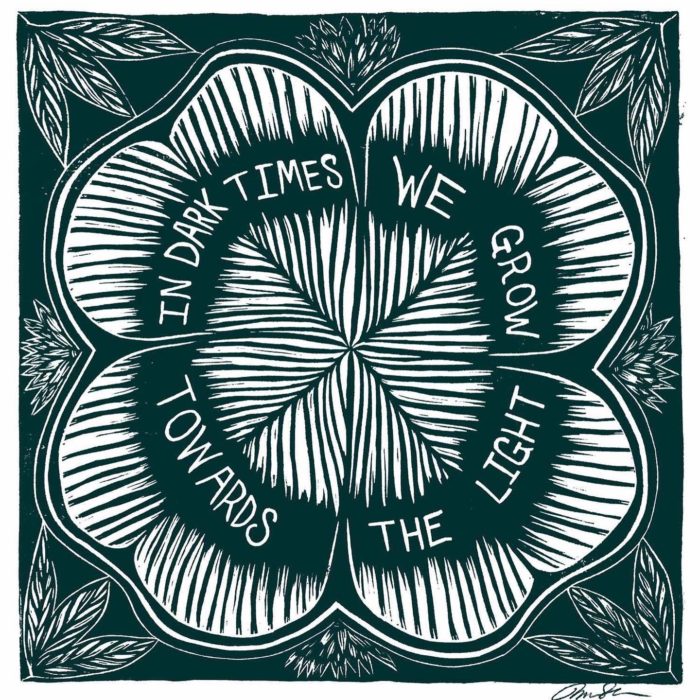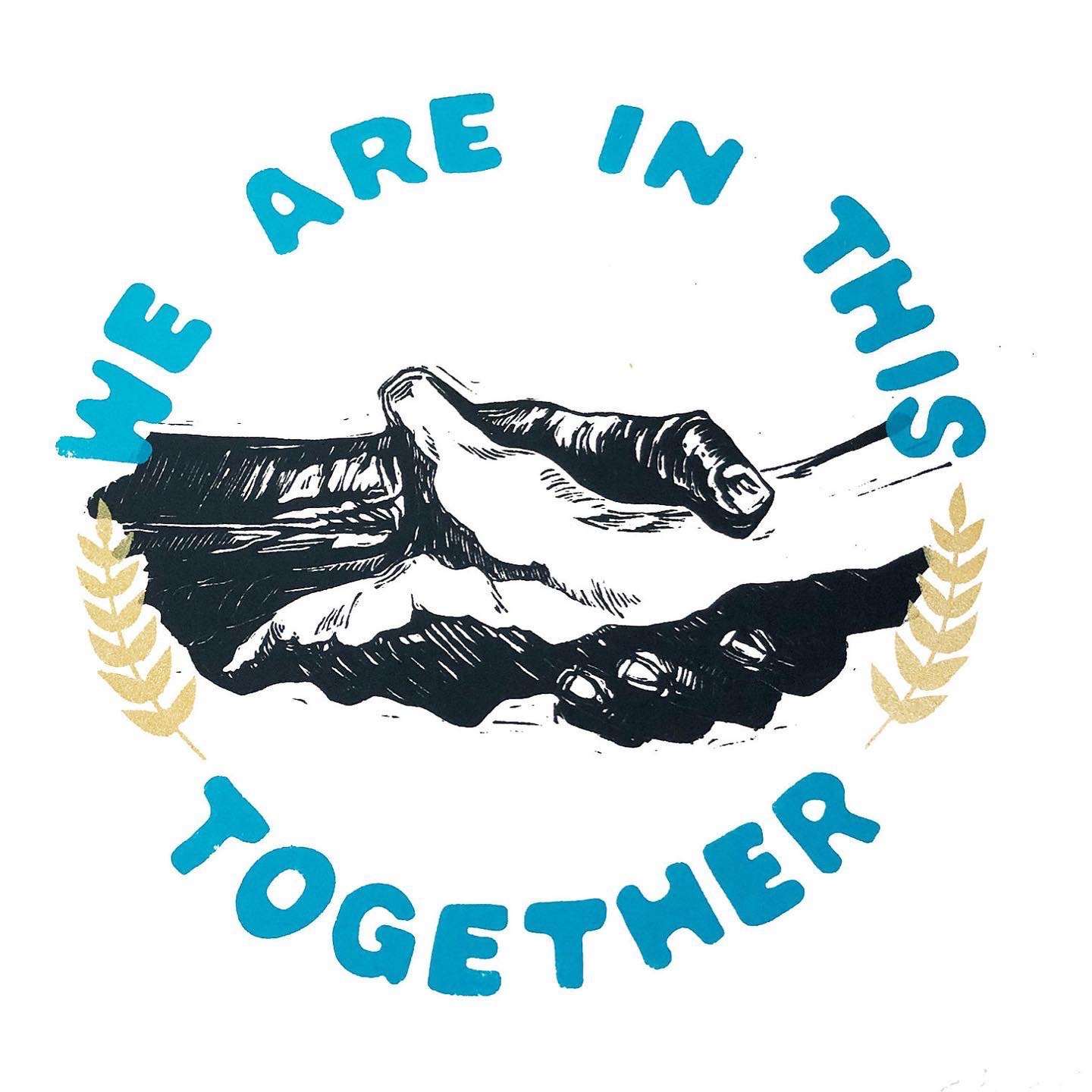by Ron Sakolsky
(art by Pete Railand / just seeds.org)
There is a virus for which there are no statistics that is silently spreading throughout the world. I speak not of the physical disease of Covid-19 for which there is presently no known cure, but of a shadow contagion which I call the “covidity blues”. The “covidity blues” is the psychological anxiety attached to the Covid-19 pandemic that has gripped the planet in a wave of despair. Fear and depression are not in and of themselves physical conditions, they are psychological reactions to perceived threats, physical or otherwise, often accompanied by a debilitating sense of loss. Unlike the Covid-19 virus itself, the “covidity blues” is not dependent upon the presence of a physical infection, but is a human response to the threat of physical infection or death associated with this novel coronavirus. The resulting existential feeling of the blues is exacerbated by the uncertainty surrounding the indeterminate length of time that the crisis will last.
However, the “covidity blues” is treatable in ways that Covid-19 is not. The antidote for the “covidity blues” does not require the development of a new vaccine. One source of the “covidity blues” is that the “social distancing” required to defend against the spread of this coronavirus accelerates our feelings of isolation and atomization just at the precise moment that we most crave social support. We miss the welcoming hugs from friends and loved ones that we have come to take for granted. In this sense, the “covidity blues” can be especially cruel to those who live alone. The question then becomes, how do we create a vibrant interpersonal support network while respectfully practicing physical but not emotional distance or, to put it in more direct terms, what is the non-physical equivalent of the hug?
One answer is mutual aid. For the last 18 years I have lived on a rock in the Salish Sea that the colonial mapmakers have called Denman Island, named after Rear Admiral Joseph Denman whose naval warship expropriated the land from the Indigenous Pentlatch people on behalf of the British Empire. Today the island’s 1100 inhabitants include a small enclave of mutual aid-minded anarchists and anarchic free spirits who have sought to honor the Indigenous origins of the place which the Pentlatch and K’omoks peoples once called Sla-Dai-Aich/Taystayic (or the Inner Island). Moreover, even outside of the “anarchist community” per se, recognition of Indigenous sovereignty is fairly widespread and mutual aid is no stranger to the island given all of the volunteer labor and support networks that make our community tick. We know how important it is to have each other’s back in times of need, and there are no cops on island to usurp the ability of the community to take care of itself when a crisis arises.
Given our situation, what is needed to respond to the challenge of both Covid-19 itself, and of the “covidity blues” which travels in its wake, is the enhancement of a core community culture that is already rooted in an empowering combination of DIY know-how and mutual aid practices among autonomous islanders. During the Covid-19 emergency, mutual aid has taken many shapes so far—– from delivering groceries to an at-risk neighbor, to sharing food resources from farms and seeds for gardens in ways that are not dependent on income, fabricating medical paraphernalia like masks, or creating social events that do not require physical contact like reading bedtime stories to children, playing music or dancing together via the local pirate radio station or the internet. These diverse forms of mutual aid, whose benefits range from the decidedly functional to the spiritually-uplifting, have sprung up spontaneously on the island and there is still room for many more to bloom in the days ahead as a lively antidote to the doldrums of the “covidity blues”. Despite all of the things about our lives that have been or will be changed for the worse by this coronavirus, I find it tremendously inspiring that every day we are creating exciting new possibilities for mutual aid based on realizing what we have in common as islanders in whatever ways continue to remain open to us and these explorations of mutuality in turn might simultaneously prefigure a more anarchistic future. Though we may not all be anarchists, the intrinsic sense of solidarity that exists among islanders is one of the primary reasons that many of us, myself included, have chosen to live here in the first place.

In engaging in community endeavors, we are fortunate to be building our expanded network of mutual aid on an existing island bedrock of caring for one another both informally as friends and neighbors (from the provision of parents with home-cooked meals for two weeks after the birth of a child to helping prepare the body of a loved one for natural burial at the end of the line) and through formal organizations with a particular purpose in mind (from the stalwart volunteer efforts of the fire department to the smooth functioning of the recycling depot not only in relation to waste disposal but as a source of revenue for grassroots community initiatives that are funded in whole or in part by the money gleaned from returnable deposits). In facing the physical threat posed by this coronavirus, we have for the most part played to our strengths as a community that has always been at its best when animated by mutual aid, and have not let the “covidity blues” destroy our precarious psychological and social equilibrium through shaming, finger-pointing, self-righteousness or cynical denial. We have realized that we do not need to be alone in dis-ease if we activate the intricate web of supportive social relationships that cradle our self-determination and define us as a community through the practice of a widening array of mutual aid initiatives that together constitute a resilient framework for navigating these hard times until a safe harbor is in sight and point beyond the horizon to unlimited possibilities.
Ron Sakolsky has long been informed and inspired by mutual aid. His 2015 book, Breaking Loose: Mutual Acquiescence or Mutual Aid (LBC/Ardent) focuses on mutual aid as an anarchist strategy and seeks to examine its polar opposite, mutual acquiescence, in order to understand why mutual aid is not more widespread. His forthcoming book, Dreams of Anarchy and the Anarchy of Dreams: Adventures at the Intersection of Anarchy and Surrealism, will be published by Autonomedia this year (unless The Virus has other plans).

